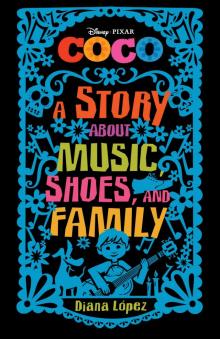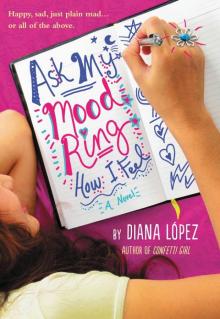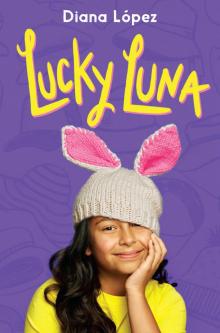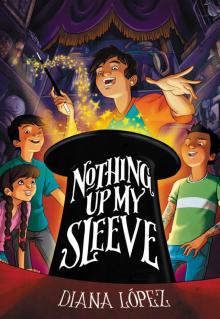- Home
- Diana Lopez
Choke Page 13
Choke Read online
Page 13
“What were you looking at?” I asked.
“There was a red light on top of the lens,” Dad said. “I guess I was looking at that. I didn’t realize I was staring at it for so long.”
The TV voice said, “Cut!” The screen went black, then the words, “Take Two” appeared. This time, Dad ignored the camera lens. We saw his profile instead. Once again, the voice said, “You may begin now, Mr. Soto.”
Dad rushed to fill the silence. “The, um — you know — um …” The poor guy couldn’t get his words out.
“What happened?” I asked. “Why were you so tongue-tied?”
“Well,” he admitted, “I got confused. It doesn’t really look that way. On TV, you see a map, but in the studio, there isn’t a map, just a big green curtain. You’re supposed to look at a monitor to figure out where to point, and at the same time, you’re supposed to read words from a teleprompter.”
“Mr. Soto,” the TV voice said.
My dad turned to it and froze again when he saw the red light above the camera.
“I hate to say this,” Mom began, “but you look like a deer caught in headlights.”
“That’s how I felt. But I was just warming up. In a minute, you’ll see me do much better.”
On the third take, Dad managed to read the words, but he spoke super fast. I could barely understand him.
“That’s when I started to hyperventilate,” he explained. “Nerves, I guess. But I get over it. Just wait.”
“Take four,” the TV voice said.
This time, Dad did better. He avoided the red light above the camera, and he slowed down his words. But even though he was getting through the weather report, he was tapping his foot a lot, and instead of pointing at the map, he was tightening and loosening his fist. He inserted a lot of filler words, too, the same ones I used in speech class — “okay,” “um,” “anyway,” “you know,” and even a Spanish one, “entonces.” He never said “entonces” on the radio. Finally, the TV voice said “Cut!” and the audition tape ended.
Next to me, Dad leaned over and stared at the screen in stunned silence. I could tell he felt bummed — double bummed. I scooted closer to him and put my hand on his knee. Mom pressed the OFF button on the remote and then put her arm around him.
After a while, he said, “I thought I did a lot better than that. Especially after I warmed up and caught my breath.”
“You weren’t that bad,” Mom said.
“I was awful. I completely choked.” He stood up, took off his jacket and tie. “I’m going to the garage. Got some cleaning to do.”
“But you’ll ruin your new shirt,” Mom said.
He just mumbled and walked away.
“Is he mad?” I asked.
“Maybe a little,” Mom said. “But at least he knows why he didn’t get the job. Your father gets too nervous when he sees the camera.”
“That’s what happens to me. Every time I have to make a speech, I choke, too. I stand in front of class, and all these people start looking at me. No matter how hard I try, I can’t relax. And then I forget stuff, even when I have my notes. It’s like my handwriting suddenly becomes a secret code. And then my foot starts tapping like it wants to run off, but the other foot knows better so it doesn’t move. It’s horrible. It’s the most horrible feeling in the world.”
Mom patted my shoulder to comfort me. “Everybody has that one class that makes them miserable. For me, it was history. I could never remember all those names and dates.”
I smiled. Knowing she had struggled, too, made me feel better.
“Your father’s very good on the radio,” she went on. “People like his voice and trust his predictions. Maybe it’s not glamorous like TV, but the radio’s a good job for him. It’s where he belongs.”
When she mentioned belonging, I dropped my head a little because I remembered everything it took to belong to the in-crowd, to become a breath sister. Playing the choking game and gossiping about others felt wrong, even when I was making fun of my worst enemies, Courtney and Alicia.
“Is something bothering you?” Mom asked.
“I had a fight with Elena,” I admitted.
“Because of Nina?”
“Yes. How did you know?”
She shrugged. “Instinct, I guess. Something told me she was trouble.”
“Why didn’t you warn me?”
“You wouldn’t have listened. Besides, you’re a smart girl. If Nina was trouble, I knew you’d figure it out on your own.”
I didn’t think of myself as smart, but Mom seemed convinced. Maybe there were different kinds of intelligence — being book smart like Elena and being smart enough to do the right thing.
Later that night, I opened my TOP FIVE notebook. “The Top Five Things I Learned from My Dad’s Audition Tape: Stage fright is genetic; red lights mean stop only when they’re hanging above a street; it’s better to look like James Bond than Ronald McDonald; not all dreams are meant to come true; and everyone wants a place to belong.”
For me, that place had always been the in-crowd, so I started a new list — The Top Five Reasons for Being in the In-Crowd. Then, I stared at the blank page. I stared for a very long time. A month ago, my pen would have scurried across the notebook, but right now, I couldn’t think of a single reason to jot down.
The next morning, I went to the school’s back parking lot and waited for Elena’s bus. As soon as I saw her, I snatched her piccolo case.
“I’m holding it hostage till you talk to me.”
She didn’t even try to grab it back.
“Okay, then, talk.”
“I know you hate me right now,” I said. “I don’t blame you. I deserve it. But I didn’t know Nina had finished that list about you, so that’s not really my fault except that I should have kept a better eye on my notebook. And I’ve been a bad friend in other ways, too. I chose Nina over you, and I chose those other girls, too. I admit it. I thought I needed them to be happy. But I already had a friend, one who really cared about me. I can’t believe how stupid I’ve been. I mean really, really stupid.”
“Yeah,” she agreed. “You scored really high on the stupidometer.”
I smiled. “Stupidometer? That’s a new one.”
“What can I say? You inspire me.”
“Ouch! That hurts,” I teased.
“Then we’re even,” she said. “So can I have my piccolo back?”
“No. Why don’t you give me your gym bag and your tackle box, too?” I reached for them. Then the weirdness dawned on me. “Why do you have a tackle box?”
“Science project,” she explained.
She handed me her things, and then we reorganized ourselves to figure out the best way to hold all her stuff. Elena had a shelf in the science lab, a cubbyhole in the band hall, and lockers in the main hallway and in the dressing room. As we toured the school to drop off her supplies, I told her everything. How Nina stole Mrs. Vargas’s money. How my dad freaked out at his audition. How my mom found Raindrop. How Ronnie broke my heart. And how the in-crowd played the choking game.
“The what?” she asked.
“The choking game. It’s what breath sisters do.”
“They choke each other?”
I nodded.
“Why would anyone do that?”
“To get high,” I explained. “But I thought it was about trust. At least, that’s how Nina sold it to me.”
“Trust?” She shook her head. “Let me tell you about trust. Trust is being an ice-skater. Trust is jumping and spinning through the air and knowing your partner is going to catch you. Trust is letting your partner hold you with one hand as he speeds across the rink, and knowing that he’s not going to drop you. Trust is keeping people away from danger, not leading them to it.”
“I know,” I said, my voice cracking a bit. “I found Nina passed out on the bathroom floor yesterday. I was so scared. But she and Liz thought it was fun.”
By now, Elena had a free arm, so she gave me a hug. I felt a
shamed but relieved, too. I had jumped in the air, and Elena had caught me.
After a moment, I said, “You really love ice-skating, don’t you?”
“Yes. And I love my piccolo, too, so give it back now. I still have to go to the band hall.”
I handed it to her. “I wish I had interests like you,” I said.
“You do have interests. I’ve told you a million times. You like old people and cats. If you didn’t have such a severe case of nerdaphobia, you’d admit it.”
“You’re really on a roll with the new words this morning.”
“Like I said — you inspire me.”
I smiled. I didn’t care how dorky her words were. I had more fun listening to Elena’s silly vocabulary than listening to the in-crowd’s gossip. I was going to write a new list, a list of reasons Elena was cool. And the number one reason would be? Word-morphs!
I stopped.
“What’s wrong?” Elena asked.
“You’re a genius!” I exclaimed. “You’re always morphing things — words, ideas, interests.”
“Yeah. So what?”
“Old people and cats,” I went on. “I like old people and cats, right? Maybe I can morph them together and solve both their problems. Mrs. Vargas has been feeling sad lately, and Raindrop needs a new home. Maybe he can be her pet therapist at Pleasant Hill!”
“What’s a pet therapist?”
I didn’t answer. I was in the middle of a brainstorm. “If he becomes her pet therapist, I can see him whenever I want, so I’ll have two reasons to visit the home! My mom wants me to volunteer this summer. I can volunteer at Pleasant Hill! And the first thing I’m going to do is fix the courtyard. That way, Raindrop could have a nice environment, and Mrs. Vargas and her friends could go outside again and enjoy a great view from their windows.”
I felt so excited. The morning flew by as I imagined how much fun I’d have working at Pleasant Hill. I couldn’t wait to tell Mom. Finally, she could stop bugging me about getting an interest.
I had made up with Elena and found a solution for Raindrop and Mrs. Vargas. The only thing bothering me now was Nina. I couldn’t pretend she didn’t exist. I had to face her and tell her I couldn’t be her breath sister anymore. I got nervous every time I thought about it, but since she was absent again, I had an extra day to work up the courage.
Soon, it was time for fourth period. Mrs. Campos stood at the door, and when she saw me, she called me over. She had a very concerned look on her face.
“Windy,” she began, “can you go to the principal’s office? I’m excusing you from today’s assignment.”
“Why do I need to go to the principal?”
“Don’t worry. You’re not in trouble. He just wants to talk to you.”
“About what?”
Mrs. Campos caught a few students eavesdropping and waved them away. Then she whispered, “About Nina.”
I swallowed hard. “What about her?”
“I’d better let the principal explain.”
I felt as stunned as my dad when he saw that red light above the TV camera. Had Nina been in the principal’s office the whole morning? Was that why I hadn’t seen her today? Did she get in trouble for something and try to blame me? If she stole Mrs. Vargas’s money, then maybe she stole something from the school. No, that couldn’t be it. Maybe the principal didn’t know about her headaches. Nina was absent a lot. She’d been held back a year for poor attendance. Maybe the principal thought she was skipping school and hoped I could tell him where she went when she wasn’t in class. This was the only explanation that made sense, but as soon as I walked into his office, I knew this meeting wasn’t about Nina’s truancy. The counselor was there, too, and she and the principal looked worried.
They asked me to close the door. Then they pointed to a chair, so I sat down.
“Do you know why you’re here?” the principal asked.
“Something about Nina?”
“Yes,” he said. “Your teachers say you’re her friend. How well do you know her?”
“I met her after Spring Break, about two months ago. So I don’t really know her that well.”
“But at this school, you know her better than anyone else, right?”
“I guess,” I said.
The counselor took off her glasses and leaned toward me. With a real gentle voice, she said, “Windy, did Nina mention any problems she might be having?”
“What kind of problems?” My shaky voice surprised me.
“Problems at home or with kids from her previous campus.”
I thought a minute. “She had a lot of friends at her other school. She really misses them.”
“And her home life?” the principal asked.
“She was mad at her parents. She said they had grounded her for infinity.”
“And she was upset about this?”
“Yes,” I said. “I’d be upset, too. Wouldn’t you?”
He nodded and scribbled something on a form.
“What’s this about?” I asked. “Is Nina in some kind of trouble?”
The counselor glanced at the principal as if asking for his permission. He said, “Go ahead.”
“Something happened last night,” the counselor began. “It’s very hard for me to tell you this, but you are her friend, so you should know.” She put her hand on my shoulder. “Last night … well, last night …”
She couldn’t finish her sentence, so the principal finished it for her. “Last night, Nina tried to kill herself.”
The principal and counselor had spoken to a few in-crowd girls, too, so by the time school ended, everyone knew about Nina’s “accident.”
“Mr. Hamilton got after her for messing up the beat,” one of the band kids said. “I guess she felt really bad about it.”
“No, she had brain cancer,” someone else said. “That’s why she got headaches and those bloodshot eyes sometimes. She probably didn’t want to go through brain surgery.”
Liz added, “I think she had a boyfriend at her other school, and he broke up with her when she got transferred.”
And the other in-crowders said, “We knew something was wrong. That’s why we got scarves, so she wouldn’t feel left out.”
I couldn’t believe all the theories and lies. Nina had never mentioned cancer or a boyfriend. People were making stuff up, and they seemed to enjoy it. Weren’t they her friends? Shouldn’t they act sad and worried instead of excited by a chance to gossip?
On the way to the bus stop, Elena asked, “Why do you think Nina did it?”
I shrugged. “It doesn’t make sense. Nina was popular. She was confident. She seemed happy.”
“And she never messed up the beat in band,” Elena added. “She was the best drummer in the school.”
We reached the back lot, but Elena’s bus hadn’t arrived yet.
“Trouper!” I heard.
I turned. Ronnie stood at the gym door and waved me over. I still liked him, but I wasn’t going to chase him around anymore.
“You come over here!” I called.
He did, which surprised me.
“Did you hear about Nina?” he asked. “Did you know something was wrong? Why didn’t she talk to us? I mean, we’re her friends. We could have helped her. Did you tell her how I feel, so she’d know she wasn’t alone?”
“Yes.”
“But did you make it clear? Because she didn’t act like she knew. She was kind of ignoring me yesterday. Did you say, ‘Ronnie likes you,’ exactly like that, so she could, like, understand that I care?”
“I said it exactly like that. She knew exactly how you felt.”
“I don’t get it, then,” he said. “Why would she hurt herself? She should have talked to me. I could have helped her. I could have been like Romeo, and she could have been Juliet.”
“Romeo and Juliet both died in the end,” Elena said.
He didn’t seem to hear her. He looked truly hurt. Pobrecito, my mom would have said — poor guy. I was jealous about the
way he cared for Nina, but I felt sorry for him, too.
“Look,” I told him. “We can’t know how another person really feels, even when a bunch of hints are in front of us.”
Elena put her hand on my shoulder. She knew how true this was — how I meant it about Nina but also about the crush I had on Ronnie.
He sighed. “Yeah. I guess you’re right,” he said.
Then he walked back to the gym, hanging his head like a whipped dog.
The next morning, the principal asked the teachers to escort us to the auditorium for an assembly even though the Spring Concert and the Awards Ceremony were scheduled for the last week of school. As far as we knew, nothing else was on the calendar. But we hoped we were in for a treat because the year before, the famous Spurs player, David Robinson, made a surprise visit to give us a pep talk about going to college someday.
As soon as everyone took a seat, the principal stepped onto the stage.
“I’m sure you’re all wondering why you’re here,” he said into the microphone. “As many of you know, we received terrible news about one of our own, Nina Díaz. Last night, we learned some new details. Nina did not try to commit suicide as we first thought.” He paused to let this settle in. “She almost died,” he continued, “because she was playing the choking game.”
I heard murmuring that got louder and louder as my classmates started to talk. Some were saying, “What’s the choking game?” and others were saying, “Do you think the principal knows that we play, too? Do you think we’ll get suspended?”
“Students,” the principal said. “Students!” he said louder. We all got quiet. “I’m sure some of you are familiar with this game,” he began. “Maybe you think it’s fun. Maybe you think it’s safe. But as you can see, it’s not. Nina’s in the hospital right now. She suffered severe brain damage, and she’s never going to be the same. Other kids have suffered brain damage, too, and some have even died. Playing the choking game is as risky and foolish as playing Russian roulette.”
I glanced around and caught Liz touching her throat as if to make sure she could still breathe.

 Coco Middle Grade Novel
Coco Middle Grade Novel Ask My Mood Ring How I Feel
Ask My Mood Ring How I Feel Choke
Choke Confetti Girl
Confetti Girl Lucky Luna
Lucky Luna Nothing Up My Sleeve
Nothing Up My Sleeve